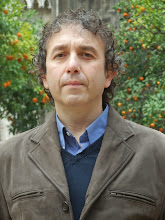PAST
PERFECT CONTINUOUS
SUBJECT + HAD + BEEN +
VERB-ing + (Complements)
STATEMENT I had been studying for ten hours
She
had been writing a composition since Sunday
They
had been walking home every day
NEGATION I had not been studying for ten
hours
She had not been
writing a composition since Sunday
They
had not been walking home every day
INTERROGATION Had I been studying for ten hours?
Had she been
writing a composition since Sunday?
Had
they been walking home every day?
TIME EXPRESSIONS:
Those related to perfect tenses.
USES:
·
To
emphasize the duration of the action: They had been playing with the
computers for days without sleeping.
·
Continuous
actions happening in the past before another short action took place: I had been
working for hours when the director came in my office.
·
I
had been trying to find an agent for months until finally I found one. (SE
SUELE TRADUCIR POR ‘LLEVAR’ EN PRETÉRITO IMPERFECTO + VERBO EN GERUNDIO).
· Lo habitual es que esas dos acciones vayan unidas por una conjunción, que puede ser temporal (WHEN, UNTIL, BEFORE), concesiva (ALTHOUGH) o causal (BECAUSE). The play was a failure because the main character had been drinking all night.
· Las expresiones temporales usadas con el PERFECT CONTINUOUS deben indicar un período, no un momento concreto.
· Si se puede contar el número de veces que ha ocurrido una cosa no se utiliza el PERFECT CONTINUOUS. He has tried has been trying to call her four times today.
· Los VERBOS ESTÁTICOS (WANT, KNOW, BELIEVE, etc.) no pueden ir en PERFECT CONTINUOUS.
· Lo habitual es que esas dos acciones vayan unidas por una conjunción, que puede ser temporal (WHEN, UNTIL, BEFORE), concesiva (ALTHOUGH) o causal (BECAUSE). The play was a failure because the main character had been drinking all night.
· Las expresiones temporales usadas con el PERFECT CONTINUOUS deben indicar un período, no un momento concreto.
· Si se puede contar el número de veces que ha ocurrido una cosa no se utiliza el PERFECT CONTINUOUS. He has tried has been trying to call her four times today.
· Los VERBOS ESTÁTICOS (WANT, KNOW, BELIEVE, etc.) no pueden ir en PERFECT CONTINUOUS.


